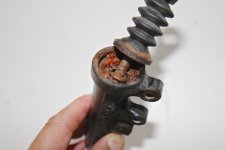- Joined
- Oct 10, 2021
- Messages
- 614
- Points
- 232
Genuine autoboxes (with torque converter) very rarely fail.
But when they do, it's very expensive and time-consuming to fix, esp the common issue of autobox flare in high mileage cars, or those used to tow horse boxes (usually too heavy, so wear the autobox clutches out and damage the ATF pump / torque converter with debris). Having been bitten by the latter issue, I avoid larger / 4x4 autos with a tow hook from 'horsey' families just in case...
Also modern autoboxes are reliant on electro-mechanical relays once again rather than the traditional governor, and any premature failure or debris in them is even more expensive to fix than a semi-auto electromechanical issue, if you can even get the spares. Luckily this one's pretty rare though, unless the ATF fluid change intervals have been ignored (or aren't specified in 'sealed for life' boxes).


